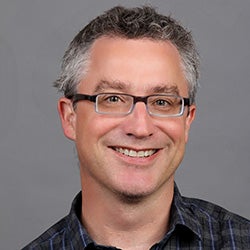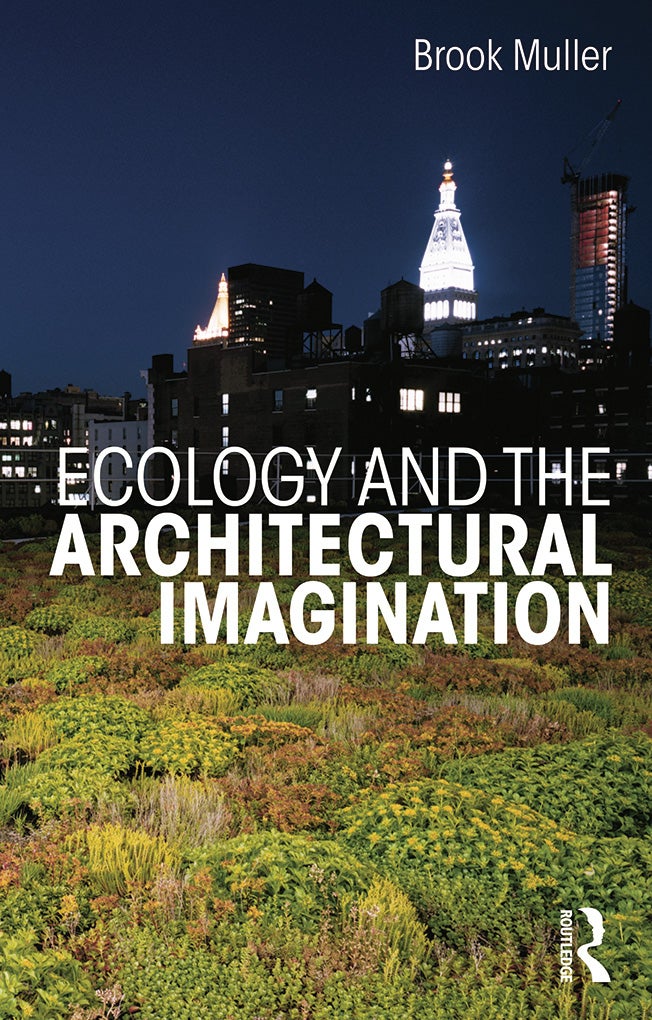Ecology and the Architectural Imagination, a new book by Brook Muller, A&AA associate dean and associate professor of architecture, examines how to integrate architecture with complex ecological systems and speculates on future intersections of these domains.
 Muller spent eight years writing the book and making refinements following peer review. Publishing company Routledge released it February 27.
Muller spent eight years writing the book and making refinements following peer review. Publishing company Routledge released it February 27.
“The book is about ways that architects can integrate ecological concerns into their work,” said Muller. “Architects can play a role to minimize negative impacts of urbanization. It’s also a way to ignite the architectural imagination.”
Much of the book alternates between theoretical ideas and specific ways of incorporating ecological interests in architecture design classes. A primary concern pertains to “stacking value,” an architectural design skill with which the designer identifies “synergies between elements and uses and deploying the minimum number of design moves to greatest possible effect,” writes Muller in the book.
In a Q&A on the Routledge website, Muller wrote, “We are not recreating natures or ecosystems in all their complexity; this is not possible. Yet we can reintroduce functional attributes of ecosystems as part of project development.”
For instance, architectural interventions that concurrently support both humans and the environment can include public transit corridors with properly configured rights-of-way that also serve wildlife crossings, urban alleyways as sites for water transmission, or buildings that furnish niches for habitat structures for a variety of species.
“Ecological design is informed, resourcefully minded, radically intensified place making for a multiplicity of lifestyles and life histories,” writes Muller.
On the back cover of the book, Professor Mark Johnson of the Department of Philosophy at UO wrote, “Recognizing that the very meaning of ecological and sustainable design is an open-ended imaginative experiment, Muller perceptively examines a number of metaphors for framing design concepts conducive to helping humans, non-humans, and ecosystems flourish together.”
Routledge upheld the book for energizing architectural design practice.
“We [Routledge] feel like it empowers the reader to get ecological literacy thereby allowing architects to remake our cities,” said Christopher Hardin, Routledge’s senior marketing manager.
Muller insists the book is necessary as architecture becomes increasingly about sustainable practice.
“We haven’t defined [ecological design], and now we need to do it,” said Muller. “This is one dimension about how we might think of architecture evolving.”

Above: Ecology and the Architectural Imagination was published February 27. The book’s opening release party will coincide with the 20th annual Holistic Options for Planet Earth Sustainability Conference (HOPES) April 1 - 6.
The book’s opening release party will coincide with the 20th annual Holistic Options for Planet Earth Sustainability Conference on April 1 - 6. Muller will speak at the event.
“Because the students have inspired the book, and the students in the Ecological Design Center organization have brought some incredible speakers over the years that have a huge influence on the book, I was honored that they thought it would be an appropriate venue to release it,” he said.
Muller has authored several peer-reviewed articles with students and other colleagues, including Josh Cerra, Cornell University professor of landscape architecture, with whom he has also co-taught studio courses. Muller cites Cerra as “a huge influence.”
In 2007, Muller and Cerra wrote the project descriptions and guidelines for the Nature in Neighborhoods “Integrating Habitats” International Design Competition sponsored by Metro, a regulatory and planning authority serving the Portland metropolitan region. The competition matched habitat and development types in Portland Metro neighborhoods. Metropolis Magazine praised the effort as a “breakthrough in the annals of design competitions.” In 2009, Muller was awarded the Oregon Campus Compact (ORCC) Faculty Award for Civic Engagement in Sustainability. ORCC awards those in statewide colleges and universities who educate environmental awareness and sustainability through community engagement.
“I am trying to inspire design students to be thinking more aggressively about [sustainable architecture],” said Muller.
His expertise in habitat-friendly building development led to teaching the winter 2014 studio course “A Machine is a Wetland for Parking In,” for which students create conceptual designs for a prospective parking garage in Portland’s South Waterfront district. The designs deal with adaptive response for parking garages intrinsically designed to treat and store polluted or contaminated water and help in the formation of constructed wetlands.
